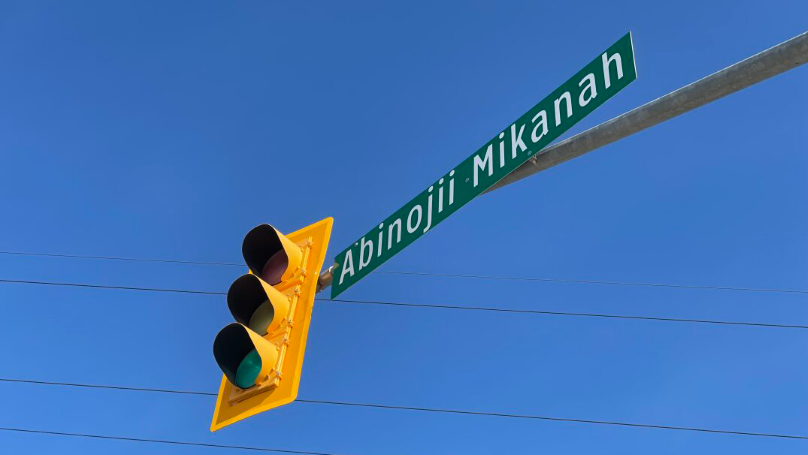We’re marking this year’s National Indigenous People’s Day a bit differently than in years past.
Rather than holding a ceremony at City Hall, this year City of Winnipeg officials and employees, Elders, and members of the community came together to mark the official renaming of Bishop Grandin Boulevard to Abinojii Mikanah.
In April, Council officially approved the name changes to Bishop Grandin Boulevard and Grandin Street. Those names are now Abinojii Mikanah and Taapweewin Way, respectively.
The changes are significant because Bishop Vital-Justin Grandin, after whom the roads were originally named, is considered an architect in Canada’s Indian Residential School system.
Grandin appealed to the federal government to increase grants to such institutions and encouraged the building of more schools in western Canada. His primary goal was to strip Indigenous peoples of their culture and heritage and assimilate them into Canadian society.
“It’s important that we not give this man any more recognition. Residential schools were horrendous places where many experienced abuse. They had profound and long-lasting effects on Indigenous peoples,” said Cecil Sveinson, Manager of Indigenous Relations Division.
“Instead, we want to lift up the voices of the members of our Indigenous Knowledge Naming Circle. They worked together to develop the names that are inclusive of some of the Indigenous groups that call these lands their own.”

Honouring children, including those who died
Abinojii Mikanah (A-bin-oh-jee Mee-kin-ah), which means “Child’s Way/Road” in Anishinaabemowin/Ojibwe, was chosen by the Indigenous Knowledge Naming Circle and approved by City Council in 2023.
Members of the Indigenous Knowledge Naming Circle believed the renaming should focus on the importance of the reclamation of language and the journey it has been to find the children that did not return home from residential schools.
“The renaming of Abinojii Mikanah is a tribute to all survivors of the residential school system and the little ancestors who never made it home. A way of honoring the children past and present, from coast to coast,” said Elder Joan Winning, Sagkeeng First Nation.
Anishinaabe Knowledge Keeper Frank Beaulieu, Bear Clan, Sandy Bay First Nation, wants the name to represent all children on Mother Earth.
“I think the name will bring people of all races and cultures together. I believe our children and grandchildren unborn will walk in a humble way with humility, respect, and love for one another,” he said.
Elder Betty Ross of Pimicikamak Cree Nation says the Creator bestowed wisdom and traditional knowledge on the circle as they gathered to discuss name changes.
“[The name] signifies power, sacredness, resilience of Indigenous nations and the revitalization of Indigenous voices and our First languages that were forever intact since time immemorial and moving forward in 2024, and beyond,” she said.
Other name changes
The Indigenous Knowledge Naming Circle also proposed the name Taapweewin Way (Tap-way-win) as a replacement for Grandin Street. Taapweewin means “truth” in Michif, the ancestral language of the Red River Métis.
Last year, Bishop Grandin Trail was officially renamed Awasisak Mēskanôw (Aa-wa-sis-uk Me-ska-noh), which means Children’s Road in Ininimowin (Cree).
Learn more about the Indigenous Knowledge Naming Circle and the street renaming process here.
